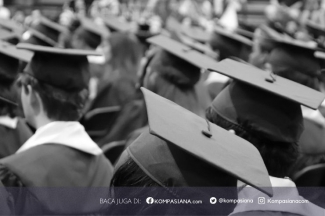As Indonesia approaches its "Indonesia Emas" milestone, the vision of a prosperous and advanced nation by 2045, the role of higher education has come under intense scrutiny. The demographic bonus, characterised by a large, youthful population, presents both tremendous opportunities and significant challenges. Yet, recent discourse questioning the necessity of university education as a tertiary need highlights a troubling disconnect. From my perspective as a senior lecturer currently pursuing a PhD overseas, it is imperative to critically examine and address these issues for the sake of Indonesia's future.
The notion that university education is a non-essential luxury is not only short-sighted but also detrimental to the nation's long-term growth. Higher education is the bedrock of innovation, critical thinking, and skilled workforce development. Countries that have successfully harnessed their demographic bonuses, such as South Korea and Singapore, have heavily invested in their educational systems. These investments have translated into robust economies driven by knowledge and technology.
In Indonesia, however, the higher education system is still grappling with outdated pedagogical approaches. The teacher-focused centric model, which dominates Indonesian universities, stifles creativity and critical thinking. This traditional approach often positions students as passive recipients of knowledge rather than active participants in their own learning journey. In contrast, my experience studying overseas has exposed me to learner-centred education, where the emphasis is on fostering independence, analytical skills, and collaborative learning. These are the very skills that Indonesia's future leaders need to navigate and drive the country's progress.
Moreover, the current perception of higher education as a tertiary need undermines efforts to elevate the quality of Indonesian universities to global standards. Universities should not be seen merely as institutions for acquiring degrees but as pivotal hubs for research, innovation, and societal advancement. The reluctance to prioritise and invest in higher education risks perpetuating a cycle of mediocrity that is incompatible with the ambitions of "Indonesia Emas."
The rise of artificial intelligence (AI) in education presents both opportunities and challenges. While AI can enhance personalised learning experiences and streamline administrative tasks, it also has the potential to undermine authentic learning if not integrated thoughtfully. Overreliance on AI-driven tools can lead to superficial learning experiences, where students may become adept at using technology but lack deep understanding and critical thinking skills. Authentic learning, which emphasises real-world relevance and active engagement, is best achieved through a student-focused approach. This requires a significant shift from the traditional teacher-centric model to one where educators facilitate and guide students in their learning journey.
Shifting from a teacher-focused to a student-focused model promotes authentic learning but demands considerable effort from educators to adapt to the rapid advancements in educational technology. Educators must be willing to embrace continuous professional development, exploring new pedagogical strategies and integrating innovative technologies effectively. This transformation is not without its challenges, but it is essential for preparing students to thrive in an increasingly complex and interconnected world.
Furthermore, higher education should be accessible and inclusive, ensuring that all segments of society can contribute to and benefit from the nation's progress. Inclusivity in education is crucial for harnessing the full potential of Indonesia's demographic bonus, moving the country from a developing to a developed status. This means addressing barriers to access, such as financial constraints, geographical limitations, and social inequalities. By making higher education more accessible, we can cultivate a diverse pool of talent, fostering creativity and innovation across all sectors of society.
In conclusion, the vision of "Indonesia Emas" will remain a distant dream unless we acknowledge and address the current shortcomings in our higher education system. As a senior lecturer and a PhD candidate witnessing the stark differences in educational approaches, I urge Indonesia to embrace a future where higher education is seen not as a tertiary luxury but as an essential driver of national prosperity. The time for revolutionising our education system is now, and it is a crucial step towards realising the full potential of our demographic bonus.
Follow Instagram @kompasianacom juga Tiktok @kompasiana biar nggak ketinggalan event seru komunitas dan tips dapat cuan dari Kompasiana. Baca juga cerita inspiratif langsung dari smartphone kamu dengan bergabung di WhatsApp Channel Kompasiana di SINI



